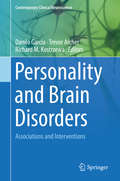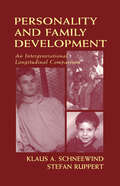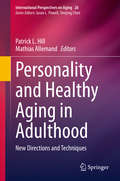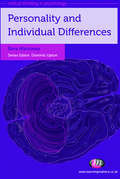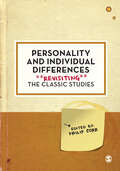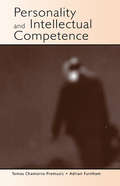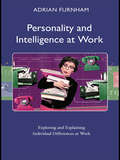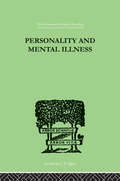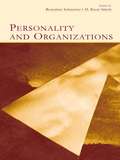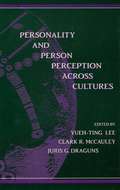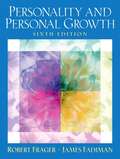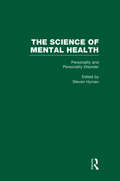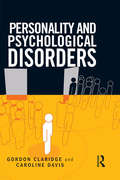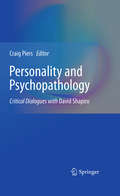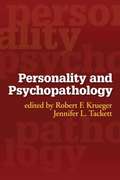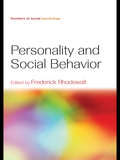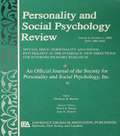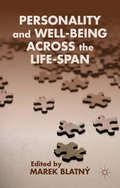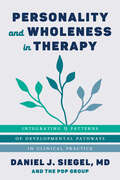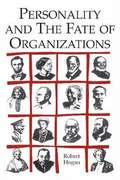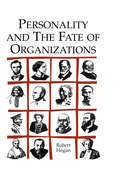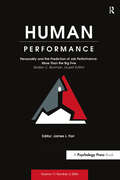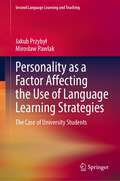- Table View
- List View
Personality and Brain Disorders: Associations and Interventions (Contemporary Clinical Neuroscience)
by Richard M. Kostrzewa Trevor Archer Danilo GarciaBrain disorders (neurodevelopmental, neurodegenerative, and affective disorders) can be investigated, treated, and prevented using person-centered methods. Because researchers have not reached a clear consensus on whether or not personality is stable or changeable, it has been difficult to outline how to use these methods in the care of people with brain disorders. Thus, the first part aims to identify the ways in which brain disorders and personality are linked. The second part explores different person-centered approaches that can be incorporated in a healthcare or education setting to help people with various brain disorders and to promote physical, mental and social health. The third part focuses on challenges and new venues.
Personality and Family Development: An Intergenerational Longitudinal Comparison
by Klaus A. Schneewind Stefan Ruppert Klaus SchneewindThis unique volume presents the results of a study of 200 German families over a period of 16 years from 1976 to 1992. This study--the findings of which yield a host of new insights into the dynamics of cross-generational personality and family development--is based on an ecopsychological framework comprising four levels of developmental analyses: * individual level--personality development, critical life events, and corresponding coping strategies; * dyadic relationships level--changes in parent-child relationships across time and development of marital relationships; * family relationship level--development of family climate and its impact on current dyadic relationships; and * contextual/ecological level--perceived changes in societal conditions, corresponding patterns of personality and coping strategies. The authors focus on the important ideas and keep methodological details to a minimum in the text. Technical issues having to do with data analysis, etc., are discussed in an appendix.
Personality and Healthy Aging in Adulthood: New Directions and Techniques (International Perspectives on Aging #26)
by Patrick L. Hill Mathias AllemandThis book highlights international efforts to better understand the role of individual differences in healthy aging by exploring new directions, methods, and questions within the field. The book considers how to measure personality and personality change during adulthood, the associations between personality and healthy aging outcomes over time, and the role of personality in building interventions to promote healthy aging. The first section considers the value of personality constructs for healthy aging outcomes beyond the broad Big Five personality dimensions. It discusses the role of attachment, purpose, and affect, and also touches on the issue of psychopathology. The second section presents innovative assessment methods, research designs beyond classical longitudinal approaches, as well as sophisticated and integrative techniques for analyzing personality change processes. The third section raises new important questions, such as how interventionists from non-personality domains can incorporate personality processes in their intervention programs. It also discusses how different domains of individual functioning may interact in concert to predict healthy aging outcomes, as well as how more integrative lifespan models of healthy aging may advance research on personality and healthy aging. Overall, this book will spark interest and chart new directions for researchers, practitioners and interventionists in healthy aging, gerontology and applied fields.
Personality and Individual Differences
by Bere MahoneyThis accessible introductory text covers core domains of variation in individual differences: the history, philosophy and methods used in individual differences psychology, personality, intellect, affect and the self. It provides concise and focused coverage of the central concepts, research and debates in this key area, while developing students' higher level skills. Activities help readers build the underpinning generic critical thinking and transferable skills they need to become independent learners, and to meet the requirements of their programme of study.
Personality and Individual Differences: Revisiting the Classic Studies (Psychology: Revisiting the Classic Studies)
by Philip CorrRevisiting the Classic Studies is a series of texts that introduces readers to the studies in psychology that changed the way we think about core topics in the discipline today. It provokes students to ask more interesting and challenging questions about the field by encouraging a deeper level of engagement, both with the details of the studies themselves and with the nature of their contribution. Edited by leading scholars in their field and written by researchers at the cutting edge of these developments, the chapters in each text provide details of the original works and their theoretical and empirical impact, and then discuss the ways in which thinking and research has advanced in the years since the studies were conducted. Personality and Individual Differences: Revisiting the Classic Studies traces 14 ground-breaking studies by researchers such as Hans Eysenck, Raymond Cattell, Ernest Tupes and Raymond Christal to re-examine and reflect on their findings and engage in a lively discussion of the subsequent work that they have inspired.
Personality and Individual Differences: Revisiting the Classic Studies (Psychology: Revisiting the Classic Studies)
by Professor Philip CorrRevisiting the Classic Studies is a series of texts that introduces readers to the studies in psychology that changed the way we think about core topics in the discipline today. It provokes students to ask more interesting and challenging questions about the field by encouraging a deeper level of engagement, both with the details of the studies themselves and with the nature of their contribution. Edited by leading scholars in their field and written by researchers at the cutting edge of these developments, the chapters in each text provide details of the original works and their theoretical and empirical impact, and then discuss the ways in which thinking and research has advanced in the years since the studies were conducted. Personality and Individual Differences: Revisiting the Classic Studies traces 14 ground-breaking studies by researchers such as Hans Eysenck, Raymond Cattell, Ernest Tupes and Raymond Christal to re-examine and reflect on their findings and engage in a lively discussion of the subsequent work that they have inspired.
Personality and Intellectual Competence
by Tomas Chamorro-Premuzic Adrian FurnhamThis book provides a comprehensive state-of-the-art review of personality and intelligence, as well as covering other variables underlying academic and occupational performance. Personality and Intellectual Competence is a unique attempt to develop a comprehensive model to understand individual difference by relating major personality dimensions to cognitive ability measures, academic and job performance, and self-assessed abilities, as well as other traditional constructs such as leadership and creativity. It will be essential reading for anyone interested in personality, intelligence, and the prediction of future achievement in general.Personality and Intellectual Competence is an outstanding account of the relationship between major individual differences constructs. With its informative summary of the last century of research in the field, this book provides a robust and systematic theoretical background for understanding the psychological determinants of future achievement. The authors have sought to combine technical expertise with applied interests, making this a groundbreaking theoretical tool for anyone concerned with the scientific prediction of human performance.
Personality and Intelligence at Work: Exploring and Explaining Individual Differences at Work
by Adrian FurnhamPersonality and Intelligence at Work examines the increasingly controversial role of individual differences in predicting and determining behaviour at work. It combines approaches from organizational psychology and personality theory to critically examine the physical, psychological and psychoanalytic aspects of individual differences, and how they impact on the world of work. Topics covered include the role of IQ at work as the best predictor of success, but also the importance of increasingly recognized social intelligences such as emotional intelligence (EQ). The significance of personality traits and the impact of temperaments on work performance are also examined, and the methods used to assess work behaviour and potential are reviewed. Psychological tests, which measure personality traits, are questioned as accurate predictors of behaviour at work, alongside other factors such as job satisfaction, productivity, absenteeism and turnover. This thoroughly revised and updated edition of Personality at Work provides a comprehensive review of the relevant literature from psychology, sociology and management science. It will be of interest to students of organizational psychology and business and management studies, as well as HR professionals.
Personality and Mental Illness: An Essay in Psychiatric Diagnosis (International Library Of Psychology)
by Bowlby, JohnFirst published in 1999. Routledge is an imprint of Taylor & Francis, an informa company.
Personality and Organizations (Organization and Management Series)
by Benjamin Schneider D. Brent SmithPersonality has always been a predictor of performance. This book of original chapters is designed to fulfill a need for a contemporary treatment of human personality in work organizations. Bringing together top scholars in the field, this book provides a comprehensive study of the role of personality in organizational life. Utilizing a personality perspective, scholars review the role of personality in groups, job satisfaction, leadership, stress, motivation, organizational climate and culture, and vocational interests. In addition, the book looks at more classical topics in personality at work, including the measurement of personality, personality-performance linkages, faking, and person-organization fit. Complete in both conceptual material and reviews of the literature across the variety of domains in which personality plays a role at work, this handbook borrows the idea that personality plays out in many ways in organizations and not just a correlate of task performance. The editors believe that this book supports this belief--that personality in its many conceptualizations is a useful lens through which to shed understanding on the broadest array of contemporary topics in industrial/organizational psychology and organizational behavior. Graduate students and researchers interested in the contributions of personality to almost any topic in which they may have interest will find it valuable.
Personality and Person Perception Across Cultures
by Juris G. Draguns Yueh-Ting Lee Clark R. McCauleyNeither human nature nor personality can be independent of culture. Human beings share certain social norms or rules within their cultural groups. Over 2000 years ago, Aristotle held that man is by nature a social animal. Similarly, Xun Kuang (298-238 B.C.), a Chinese philosopher, pointed out that humans in social groups can not function without shared guidance or rules. This book is designed to provide readers with a perspective on how people are different from, and similar to, each other --both within and across cultures. One of its goals is to offer a practical guide for people preparing to interact with those whose cultural background is different from their own.
Personality and Personal Growth
by Robert Frager James FadimanWith a newly revised and streamlined organization, the Sixth Edition maintains its cross-cultural, global, and gender-balanced perspectives while emphasizing humanistic and transpersonal psychologists in its exploration of the positive aspects of major personality theorists, stressing each one's relevance for personal understanding. Highly praised for its exceptionally well-written style and accessibility, this book encourages and supports readers in using themselves as the primary touchstone for each theory. Each chapter gives readers opportunities to validate their insights through direct experience, and, by observing their own reactions, come to their own conclusions about the utility and value of each theory. a newly revised, and a Companion Website For professionals with a career in psychology, sociology, and/or social work.
Personality and Personality Disorders: The Science of Mental Health (The Science of Mental Health #7)
by Steven HymanFirst published in 2001. This is Volume 7 in a series of ten on the Science of Mental Health. One of the most challenging areas of behavioral research is the study of personality and personality disorders. The main challenge can be stated directly: it is difficult to know with certainty which personality traits are fundamental and which are complex elaborations of fundamental traits. This is a collection of works under the sections of Description, Epidemiology, Genes and Environment, Peers and Neighborhoods, Neurobiology and Behavior and Treatment.
Personality and Psychological Disorders
by Caroline Davis Gordon ClaridgeIn recent years, the assumption that there is a significant connection between normal psychological and biological differences and the development of psychological disorders has grown and research in this area has developed rapidly.This textbook, written by internationally known psychologists with expertise in both the areas of abnormal and differential psychology, aims to integrate evidence and idea from healthy personality and temperament on the one hand and psychological disorders on the other. This is achieved by viewing personality traits as predispositions to disorder, and by questioning how far the causes of various disorders can be seen as an extension or exaggeration of processes underlying normal personality or temperament. These main themes are discussed using a biological perspective, i.e., based on the theory that personality can be deconstructed into a number of basic dimensions (of biological origin) that also act as vulnerability factors for disorder.This is a second-level textbook for undergraduate students of psychology, but will also be recommended for health professionals and their trainees, psychiatrists, clinical psychologists and nurses.
Personality and Psychopathology
by Craig PiersWith his penetrating theory of personality and his nuanced understanding of the psychotherapeutic relationship, David Shapiro has influenced clinicians across the theoretical spectrum since the publication of Neurotic Styles in 1965. This influence is on vivid display in Personality and Psychopathology, as noted contemporary theorists critically evaluate his work in a fascinating dialogue with Shapiro himself. Starting with a crucial therapeutic observation--the centrality of the relationship between what the client says in session and how it is said--contributors revisit his core concepts regarding personality development, the prevolitional aspects of psychopathology, the limits to self-understanding, and the defensive uses of self-deception in light of current psychodynamic, evolutionary, and systems theory. Shapiro's replies, and the contributors' rejoinders, highlight points of departure and agreement and provide further clarification and extension of his ideas on a wide range of salient topics, including: The experience of autonomy in schizophrenia. Defensive thinking to prevent dreaded states of mind. The linguistics of self-deceptive speech. Self-deception as a reproductive strategy. Intentionality and craving in addiction. The subjective experience of hypomania. Personality and Psychopathology affords psychotherapists and research psychologists not only a unique opportunity to gain insight into Shapiro's contributions, but also new lenses for re-examining their own work.
Personality and Psychopathology
by Jennifer L. Tackett Robert F. KruegerTraditionally, personality and psychopathology have been distinct areas of inquiry. This important volume reviews influential research programs that increasingly bridge the gap between the two areas. Presented are compelling perspectives on whether certain personality traits or structures confer risks for mental illness, how temperament interacts with other influences on psychological adaptation, links between personality disorders and mood and anxiety disorders, implications for effective intervention, and more.
Personality and Social Behavior (Frontiers of Social Psychology)
by Frederick RhodewaltThe study of the relationship between the person and the situation has had a long history in psychology. Many theories of personality are set on an interpersonal stage and many social phenomena are played out differently as the cast of characters change. At times the study of persons and situations has been contentious, however, recent interest in process models of personality and social interaction have focused on the ways people navigate, influence, and are influenced by their social worlds. Personality and Social Behavior contains a series of essays on topics where a transactional analysis of the person and situation has proved most fruitful. Contributions span the personality and social psychology spectrum and include such topics as new units in personality; neuroscience perspectives on interpersonal personality; social and interpersonal frameworks for understanding the self and self-esteem; and personality process analyses of romantic relationships, prejudice, health, and leadership. This volume provides essential reading for researchers with an interest in this core topic in social psychology and may also be used as a text on related upper-level courses.
Personality and Social Psychology at the Interface: New Directions for Interdisciplinary Research: A Special Issue of personality and Social Psychology Review
by Julie K. Norem Marilynn B. Brewer David A. KennyThis special issue provides a view of the past, present, and future of the field of personality and social psychology as an interdisciplinary endeavor. Collectively, the articles illustrate the vital contributions that can be made pursuing the reciprocal connections between personality/social psychology and psychobiology; developmental psychology; comparative psychology and evolutionary biology; clinical and health psychology; communication studies; organizational studies and systems theory; and cultural anthropology. The papers reflect the collective past and present of the field and set an agenda for a collective future.
Personality and Well-being Across the Life-Span
by Marek BlatnýBoth an individual's personality and well-being are important throughout their lives. This book explores the current research on links between personality predictors of well-being and social adjustment using empirical studies to suggest that their influence can vary depending on the key developmental stage.
Personality and Wholeness in Therapy: Integrating 9 Patterns of Developmental Pathways in Clinical Practice (Norton Series on Interpersonal Neurobiology #0)
by PDP Group Daniel J. SiegelA new way to consider patterns of personality, with the combined application of neurobiology and traditional wisdom. Personality and Wholeness in Psychotherapy applies the perspective of interpersonal neurobiology to a traditional wisdom framework widely known as the Enneagram of Personality. This framework describes a lifespan developmental personality model of nine distinct, key strategies that people use to make sense of and cope with their experiences and interactions with the world. These strategies can be understood as nine Patterns of Developmental Pathways, or PDPs. This book provides mental health practitioners with both a theoretical understanding of PDPs and practical tools for implementing the framework in clinical settings. Readers will find detailed descriptions of the nine core patterns of personality as well as integrative practices specific to each of these patterns that can help people work towards states of well-being and wholeness. This innovative book has the potential to unlock deep and lasting change in problematic and perplexing patterns of thinking, feeling, and behaving, transforming personality from a prison to a playground for readers and clients alike.
Personality and the Fate of Organizations
by Robert HoganArguing that personality and performance are intricately linked, Hogan offers a systematic account of the nature of personality, showing how to use personality to understand, evaluate, select, deselect, train and understand organizations. He contends that by better understanding other people, readers will be able to pursue their personal, social and organizational goals more efficiently.
Personality and the Fate of Organizations
by Robert HoganPersonality and performance are intricately linked, and personality has proven to have a direct influence on an individual's leadership ability and style, team performance, and overall organizational effectiveness. In Personality and the Fate of Organizations, author Robert Hogan offers a systematic account of the nature of personality, showing how to use personality to understand organizations and to understand, evaluate, select, deselect, and train people. This book brings insights from a leading industrial organizational psychologist who asserts that personality is real, and that it determines the careers of individuals and the fate of organizations. The author’s goal is to increase the reader’s ability to understand other people—how they are alike, how they are different, and why they do what they do. Armed with this understanding, readers will be able to pursue their personal, social, and organizational goals more efficiently. A practical reference, this text is extremely useful for MBA students and for all those studying organizational psychology and leadership.
Personality and the Foundations of Political Behavior
by Jeffery J. MondakPersonality and the Foundations of Political Behavior is the first study in more than 30 years to investigate the broad significance of personality traits for mass political behavior. Drawing on the Big Five personality trait framework, Jeffery J. Mondak argues that attention to personality provides a valuable means to integrate biological and environmental influences in rich, nuanced theories and empirical tests of the antecedents of political behavior. Development of such holistic accounts is critical, Mondak contends, if inquiry is to move beyond simple "blank slate" environmental depictions of political engagement. Analyses examining multiple facets of political information, political attitudes, and participation reveal that the Big Five trait dimensions - openness to experience, conscientiousness, extraversion, agreeableness, and emotional stability - produce both direct and indirect effects on a wide range of political phenomena.
Personality and the Prediction of Job Performance: More Than the Big Five: A Special Issue of Human Performance
by Walter C. BormanThe three primary papers in this special issue explore personality measurement in both directions, that is, more narrow and specific and more broad and heterogeneous. The first paper reviews research on conditional reasoning, with a focus on the construct of aggression. Next, tolerance for contradiction is explored, which is defined as a mode of thinking that accepts and even thrives on apparent contradictory information. The last primary paper covers core self evaluation, which combines measures of four traits: locus of control, self-esteem, generalized self-efficacy, and emotional stability. The special issue concludes with provocative and insightful critique and commentary of the three primary papers. It notes some important points of criticism, but is primarily positive and laudatory of these research programs.
Personality as a Factor Affecting the Use of Language Learning Strategies: The Case of University Students (Second Language Learning and Teaching)
by Mirosław Pawlak Jakub PrzybyłThe book explores the relationships between the personality traits of Polish university students learning English as a foreign language and their use of language learning strategies (LLS). It provides a solid theoretical background for the investigation of the interface between the two constructs, describes the applied analytical procedures in detail, and reports the results and implications of a large-scale study. Chapter 1 presents multiple perspectives on the investigation of human personality and presents insights from a selection of studies into the role of personality in foreign language learning. Chapter 2 addresses the construct of LLS, while Chapter 3 links strategy use to other individual learner characteristics, with a focus on personality. Chapter 4 sets the methodological framework for the empirical investigation, describes the rationale for conducting the study, and includes a thorough description of analytical procedures. Chapter 5 presents the results of the study and highlights their pedagogical implications. Finally, limitations of the study are presented and some directions for future research are suggested. The monograph will be of interest to scholars investigating the role of personality in SLA as well as graduate and postgraduate students in applied linguistics.
